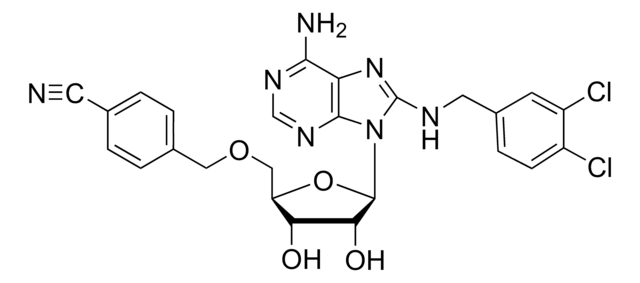SML0964
KNK437
≥98% (HPLC)
Synonym(s):
3-(1,3-Benzodioxol-5-ylmethylene)-2-oxo-1-pyrrolidinecarboxaldehyde
Sign Into View Organizational & Contract Pricing
All Photos(1)
About This Item
Empirical Formula (Hill Notation):
C13H11NO4
CAS Number:
Molecular Weight:
245.23
UNSPSC Code:
12352200
NACRES:
NA.77
Recommended Products
Quality Level
Assay
≥98% (HPLC)
form
powder
color
white to beige
solubility
DMSO: 5 mg/mL, clear (warmed)
storage temp.
room temp
Application
KNK437 has been used:
- as a heat shock factor 1 (HSF1) inhibitor to study its effects on the inhibition of viability and apoptosis activation in chemoresistant mice cells
- as an HSF1 inhibitor to study its effects on viability and apoptosis of colorectal cancer cells
- as a heat shock protein 70 (HSP70) inhibitor to study its effects on glutamine-induced HSP70 and inflammatory mediator release
Biochem/physiol Actions
KNK437 inhibits the accumulation of heat shock proteins (including hsp -27, -40, -70, -72 and -105). KNK437 inhibits thermotolerance in cells with greater potency than quercetin.
KNK437 is a benzylidene lactam compound.
Storage Class Code
11 - Combustible Solids
WGK
WGK 3
Flash Point(F)
Not applicable
Flash Point(C)
Not applicable
Certificates of Analysis (COA)
Search for Certificates of Analysis (COA) by entering the products Lot/Batch Number. Lot and Batch Numbers can be found on a product’s label following the words ‘Lot’ or ‘Batch’.
Already Own This Product?
Find documentation for the products that you have recently purchased in the Document Library.
Customers Also Viewed
An in vitro model to consider the effect of 2 mM glutamine and KNK437 on endotoxin-stimulated release of heat shock protein 70 and inflammatory mediators
Marino L V, et al.
Nutrition, 32(3), 375-383 (2016)
S Yokota et al.
Cancer research, 60(11), 2942-2948 (2000-06-13)
Cells exposed to heat or other types of stressors transiently synthesize a group of proteins known as heat shock proteins (HSPs). A nonlethal heat treatment can elicit in the cells an ability to resist subsequent lethal heat treatments. We report
Metabolic enzyme PDK3 forms a positive feedback loop with transcription factor HSF1 to drive chemoresistance
Xu J, et al.
Theranostics, 9(10), 2999-2999 (2019)
Heat shock factor 1 epigenetically stimulates glutaminase-1-dependent mTOR activation to promote colorectal carcinogenesis
Li J, et al.
Molecular Therapy, 26(7), 1828-1839 (2018)
Our team of scientists has experience in all areas of research including Life Science, Material Science, Chemical Synthesis, Chromatography, Analytical and many others.
Contact Technical Service












